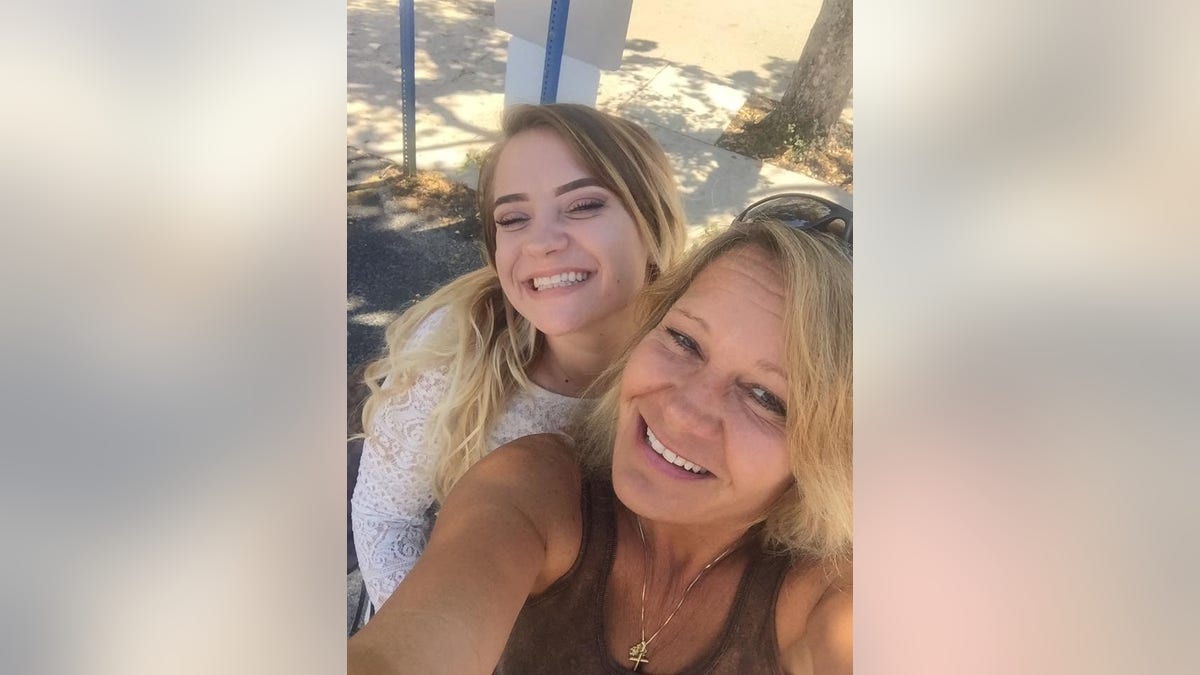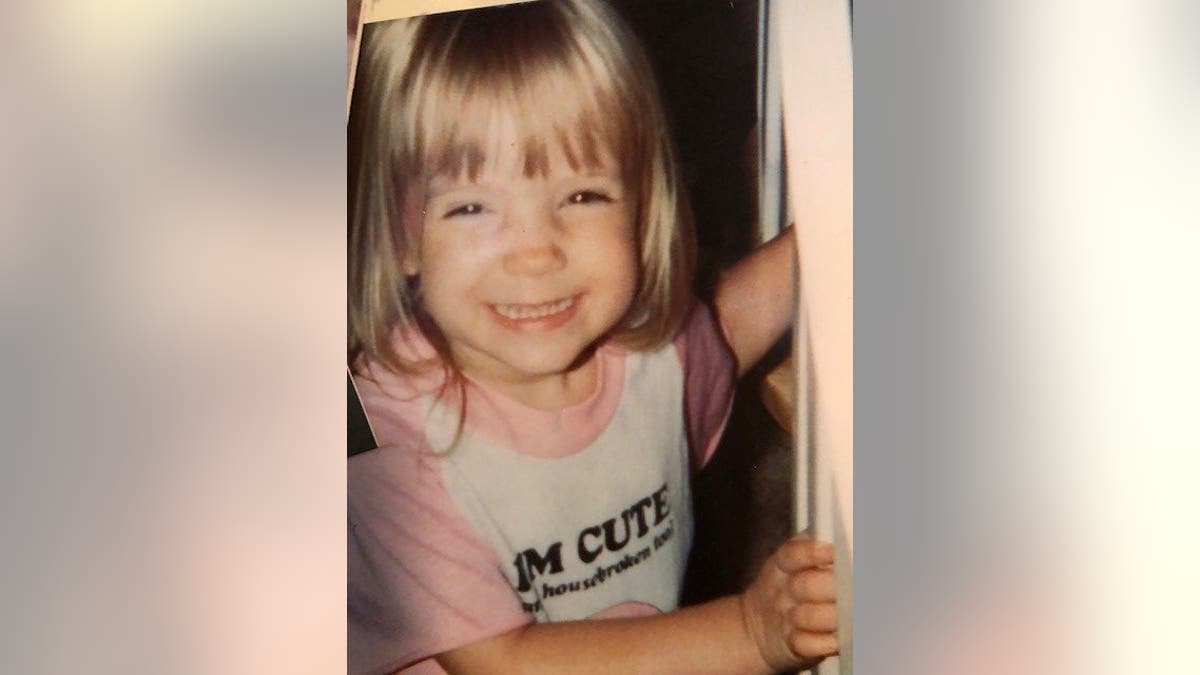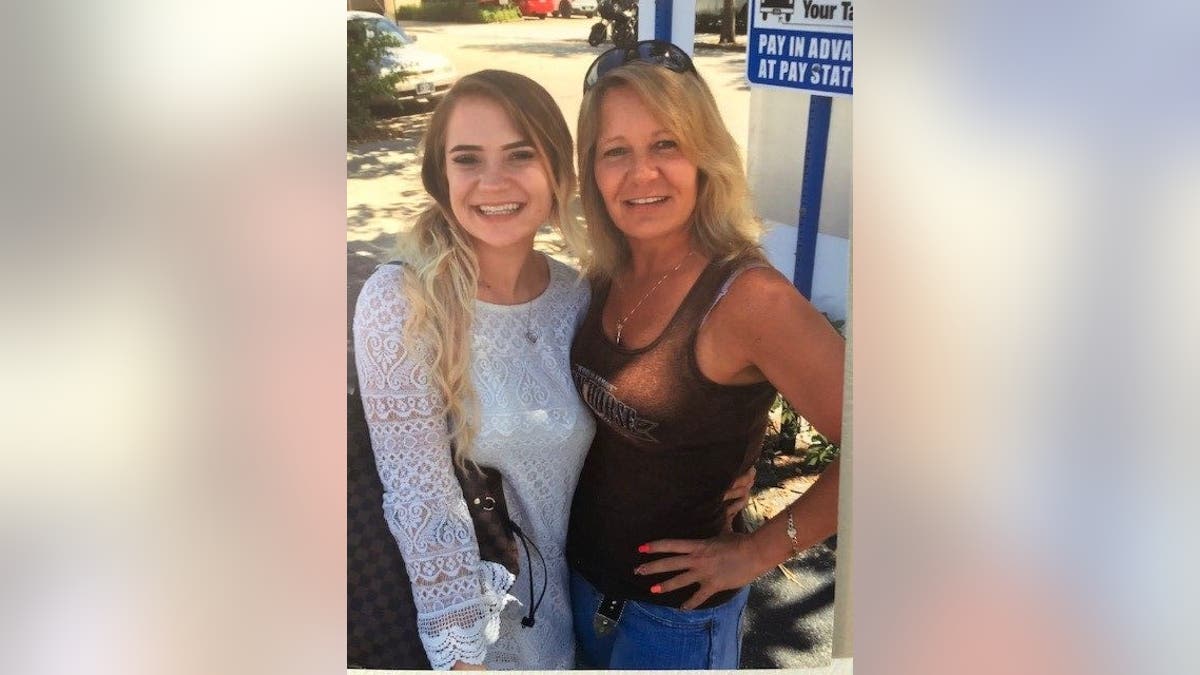
Dawn pictured with her daughter, Taylor. (Courtesy of the author)
Three days after Thanksgiving my daughter Taylor died of a fentanyl overdose. She was 23 years old. Even as I write these words, I still don’t believe it’s true.
Taylor had fought two powerful demons in her life: addiction and bipolar disease. At Thanksgiving, she’d just been released from jail after serving two months for possession of cocaine and heroin.
Taylor had always been a free spirit, running to different places looking for new friends and adventures, seeking a sense of peace that always eluded her. She’d be gone for months at a time, then come home, stay for a while, and be off again.
But last Thanksgiving, after getting out of jail, she was adamant that she would never end up back there. And Taylor was optimistic. She was going to stay away from drugs and was making plans for her future. She was positive about the new life ahead of her. And I was very hopeful that she would remain sober.
The next day I went to work. By the time I returned home, she was gone. I was instantly worried and had a gut feeling that she was running back to drugs, the same escape route she’d always taken. She avoided any and all of my efforts to reach out to her in those last few days. Then I received the confirmation that my mother’s intuition was correct. That Sunday evening authorities found her body in a hotel room in West Palm Beach.

While in jail, Taylor’s possessions were held for her in a clear plastic bag that we found after she died. It contained simple things; her Bible, a white T-shirt, a pair of boxers, and a letter spelling out the true picture of her personal torture.
She had scratched out her deepest agonies, in her tiny handwriting, on the back of her arrest report. We’ll never know if these were meant to be her last words.
Taylor had a gift for prose, art and poetry. Creativity had always been an essential part of her. Even when marred by the influence of drugs, she communicated to us through her writing. She was captive in an emotional nightmare of grief and remorse and dealt with it through her words.
Her sentiments, expressed in the letter we found, would have a chilling effect on all of us. For me, it held the dark truth of what sent Taylor into an emotional spiral that had begun in her childhood.
This except from Taylor’s final letter revealed what had haunted her, and what her father had done:
“There’s something dark hanging over my head that we all try to ignore. It’ll cause me and everyone I love, a lot of pain in the future. But for now, we carry on. Even after my dad disappears and the memory of him softens, his abuse lightens in my mind and though I long for him, we all learn to live without him.”
It wasn’t until after her death that I found out that Taylor’s father had molested her from the age of three until she was seven. After she died, I was going through more of her personal belongings and found a journal she’d written at one of the many rehab facilities she’d been in. That’s when I discovered the truth of her father’s disgusting, foul actions. Why didn’t she ever confide in me? Why couldn’t she include me in her torture? And, how did I not know? I failed her by not recognizing the pain that possessed her.
Shortly after that time, he was gone from our lives. But his actions threw Taylor into a confusing mix of longing for her lost father and loathing for him for what he’d done. I first recognized the depth of her misery when she was about 13 and started cutting herself.
I immediately sought help for my troubled daughter. We endured five years of psychiatric treatment, family therapy, and outpatient mental health support. She was diagnosed bipolar during this time and was on appropriate medications that had her condition under control.
But once she turned 18, my medical insurance dropped her from my policy. She began self-medicating with alcohol and drugs. I could see her life spiraling out of control, searching for peace yet becoming an addict. I felt helpless, unable to find medical programs for her as an uninsured adult to get her the help she so desperately needed.

Taylor had problems and was undone by them. But she was not a desperate young woman living on the streets or scorned by her family. She was beautiful and loved. We never pushed her out or away or gave up on her for her inability to conquer her drug addiction.
We loved her and always tried hard to help her overcome the effects of the torture that haunted her. I blame myself, which any mother might do, but I also know that I lost her to an internal torment that forced her to numb the pain any way she could.
Our family tragedy is barely four months old, and I can see no way of getting over the pain. But during Taylor’s funeral service, as her sister Autumn read Taylor’s letter out loud, I was given a gift. I discovered that her words might be a lifeline for someone else. That is why I’m making it public here.
As Autumn read, everyone took a collective, breathless pause. Then the perfect silence was broken by sobbing coming from the back of the room. When Autumn finished, a young man who I didn’t know approached me and bent down to hug me. He was holding back nothing and consumed by his tears of regret. He returned to his seat at the back of the room, but everyone could still hear his pitiful sobs that continued to echo the pain tearing at him.
His sister contacted Autumn the next day. The young man had been a friend of Taylor’s and also a heroin user. His sister said the letter had an important effect on him. He is now determined to stop using drugs.
The Centers for Disease Control issued a new report in March indicating that fentanyl deaths by overdose are on a dangerous rise. At roughly 1,600 annually in 2012, the number jumped to 18,335 by the end of 2016. And they continued to climb, to as many as 70,000 in 2017. Fentanyl is responsible for more deaths than any other type of opioid.
Taylor’s legacy is one of missed opportunities and broken promises. Her father never responded to the need Taylor harbored to reconcile the harm he’d done to her. He refused to participate in therapy sessions. He didn’t even come to her funeral.
I believe his actions are at the root of Taylor’s emotional anguish and probably drove her drug dependency. She wrote eloquently about the power of her addiction:
"A deafening, quiet calm storm rush, breathing only when absolutely necessary. I nod into a bright, soft, warm ocean. I’m not sad, I’m not happy, I just am. My mind isn’t screaming with worry, regret or shame. I can breathe if I want, I can stop and be gone. There is power in my pain now. I found the wholeness my aching mind, heart and soul so badly craved."
And now, what’s left for me is to imagine my daughter, beautiful and kind, incarcerated for possession of the drugs that gave her solace, and sitting in a jail cell composing this note, leaving it behind for us to study and to help us better appreciate her truths.
If her letter can help even one family understand, get clarity, and get help, there is relief in that for all of us who are part of Taylor’s family.
CLICK HERE TO GET THE FOX NEWS APP
Our Thanksgiving day together was amazing. We cooked, laughed, and spent great quality time together. I’m truly thankful we had such a wonderful day together. It’s a cherished memory that will never leave me. Because all I have now is memories and pictures. And Taylor’s letter, that may have been her last cry for help.
"I’ve always craved attention, my father probably plays the biggest piece of that. He’s a constant hole for me, a pain strikes my chest whenever I think about him. I’ve always been one to gravitate towards people who couldn’t possibly be any good for me. The pain ripples from my heart in shockwaves through my entire being, I can hardly stand it physically. Someone is stabbing my heart repeatedly and that someone, is me."








































